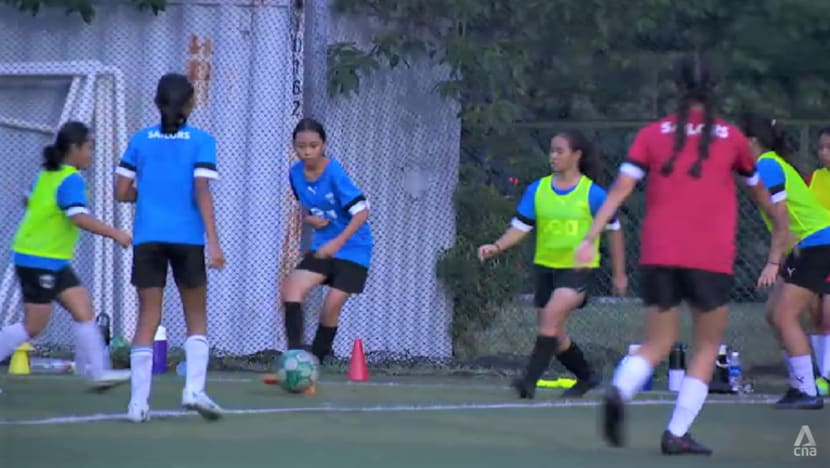Singapore women’s football league kicks off expansion after record prize money
The league is adding two more teams to its upcoming season as it seeks to elevate players’ standards and build on growing global interest in women’s football.

Football players practice on a field in Singapore.
SINGAPORE: When she was eight years old, striker Nur Izzati Rosni tagged along with her brothers to play football as the only girl in their all-boys games.
This year, at age 22, Izzati was the top scorer in the Singapore Women's Premier League (WPL) following a historic season that saw her team, champions Lion City Sailors FC, receive the largest prize money in the league's history.
The nation’s top-flight women’s football league clinched its first title sponsorship this year since its launch in 2000, with a prize money of S$25,000 for the champions – five times more than last season’s.
The title sponsor, consulting firm Deloitte, will boost the local women’s football scene with more than S$300,000 in a three-year deal.
“With the boom we're seeing in women's football worldwide in the last couple of years, and with a golden generation of young female footballers coming through Singapore, we felt that it was time for us to get behind this,” said Mr James Walton, Deloitte Southeast Asia’s sports business group leader.
“Sometime around the last World Cup, we've really hit a tipping point in women's football and from here, the only way is up.”
The league said it is adding two more teams to its upcoming season – bringing the total number of teams to nine – as it seeks to elevate players’ standards and build on growing global interest in women’s football.
RAISING STANDARDS, ADDING BUZZ
Securing sponsors like Deloitte will raise the standards for the sport as funding will be pumped into training, facilities, medical, sport science and even remuneration, said Mr Chew Chun-Liang, chief executive officer of Lion City Sailors FC.
Deloitte’s presence has already made a significant difference in the season that just passed, players said, with matches live streamed on YouTube, scores updated live, as well as a place to call home – Yishun stadium.
“We’ve never had our matches on live stream, our scores didn’t use to be live, nobody updated our tournament or league. This (sponsorship) creates awareness for people who don’t know that there’s a women’s league in Singapore,” said Izzati.
“It feels like we’re professionals, just like the guys’ teams.”
Players hope that bringing more sponsors on board can lighten the load on the athletes, most of whom need to manage the sport with work or school.
“It’s really tiring just to perform well,” said Izzati, who has been juggling homework and football since her secondary school days. “I hope that we can become professionals so we can ease off that burden and just focus on football, which we’re really passionate about and willing to give our all (to)."
Women football players in Singapore get little financial remuneration – typically only for travel allowance – compared to professional players in the men’s league, said Mr Walton.
Clubs and coaches hope that having sponsors can help to create more buzz in the media and bring in more fans.
“Running a league is not easy – you need resources and financial support,” said Mr Chew. “Having more sponsors will help to elevate the standard of football in many aspects, including creating awareness on social media, broadcast, bringing the fans and creating the hype.”
WOMEN’S FOOTBALL GAINING MOMENTUM
Internationally, women’s football is gradually attracting more fans, with some leagues in Europe boasting record viewers this year.
The local scene is seeing similar trends. There is a growing fan base and ticketed events have attracted substantial crowds, Ms Julie Teo, chairperson of the women's committee at the Football Association of Singapore (FAS), told CNA.
“We've seen an increase in interest as things open up after COVID-19. We were able to host games again, and international matches. And for the first time, we had ticketed events with a good sizeable crowd of 2,000 to 3,000 spectators,” she said.
With the women’s league set to expand, fans can expect more matches, multiple venues and the possibility of attracting foreign players.
Mr Walton said he hopes more women will take up football, as the sport presents a host of opportunities such as education scholarships to universities.
“If you want to get involved in a sport where there will be opportunities and investment, then football is definitely a way to go,” he said.
“It's often not seen as a sport for women, but if you come down and just watch a game in the WPL, watch the Singapore national team play, you'll see that it really is a game for both men and women.”



















